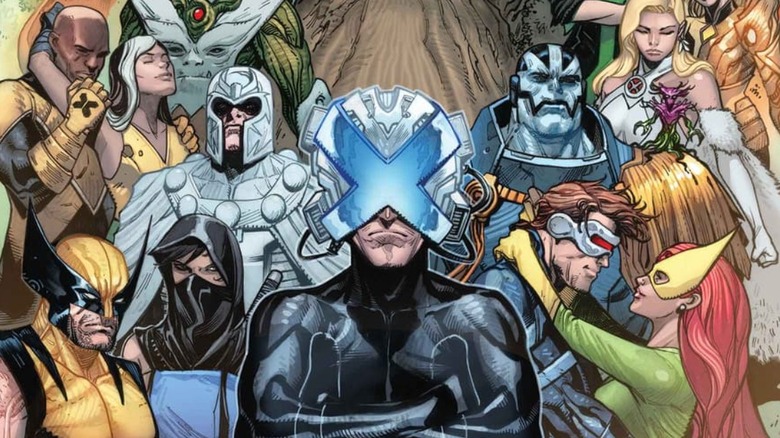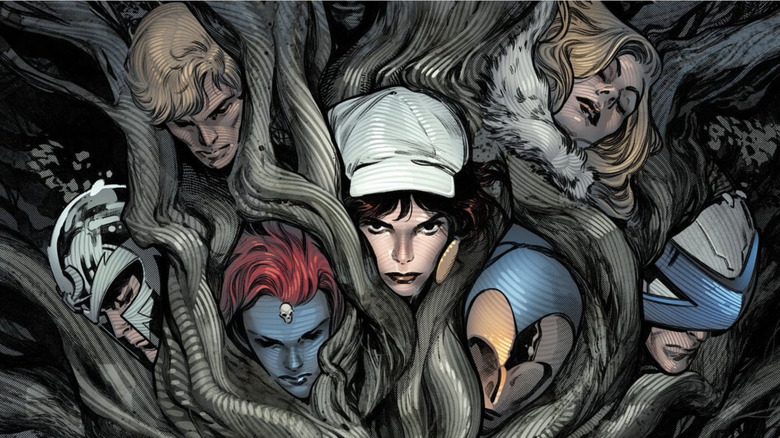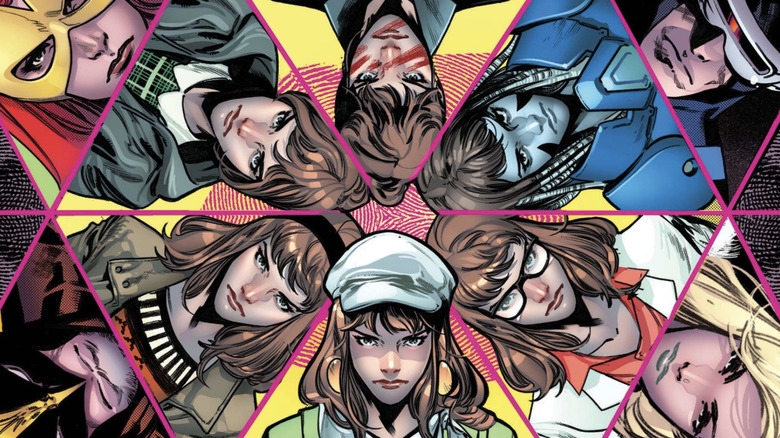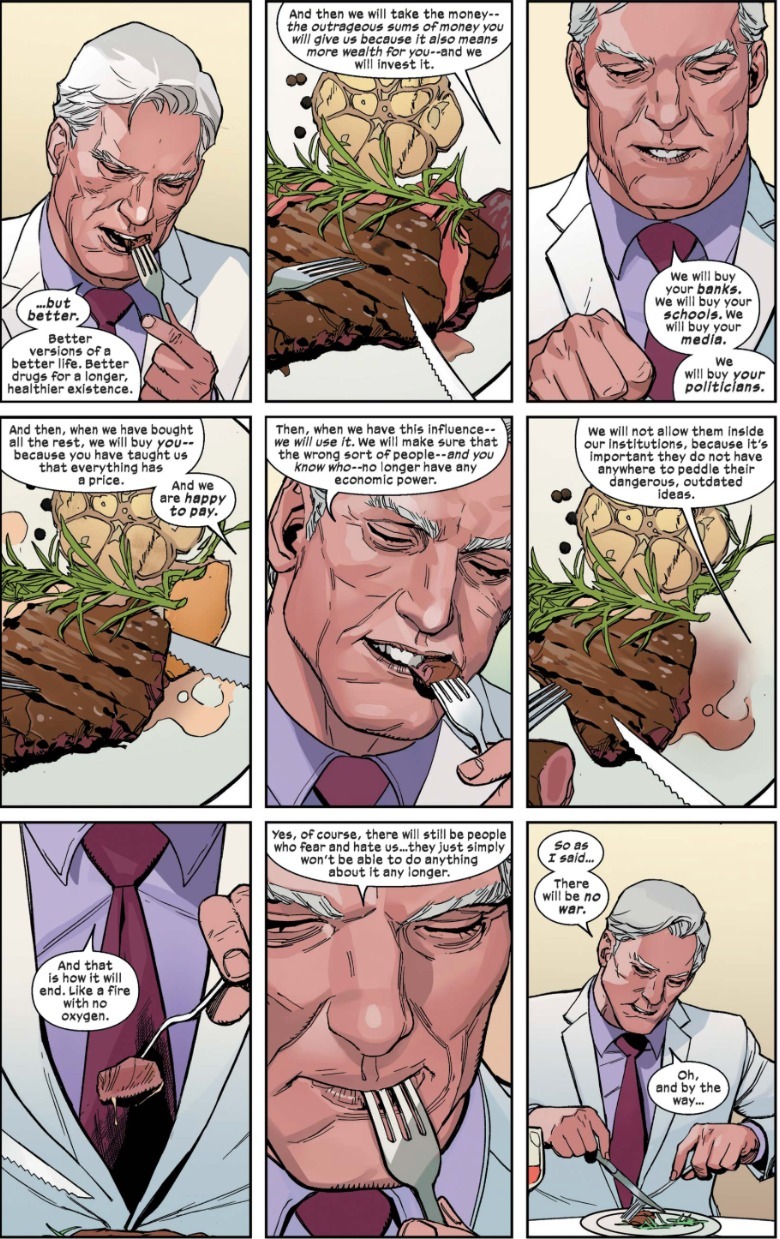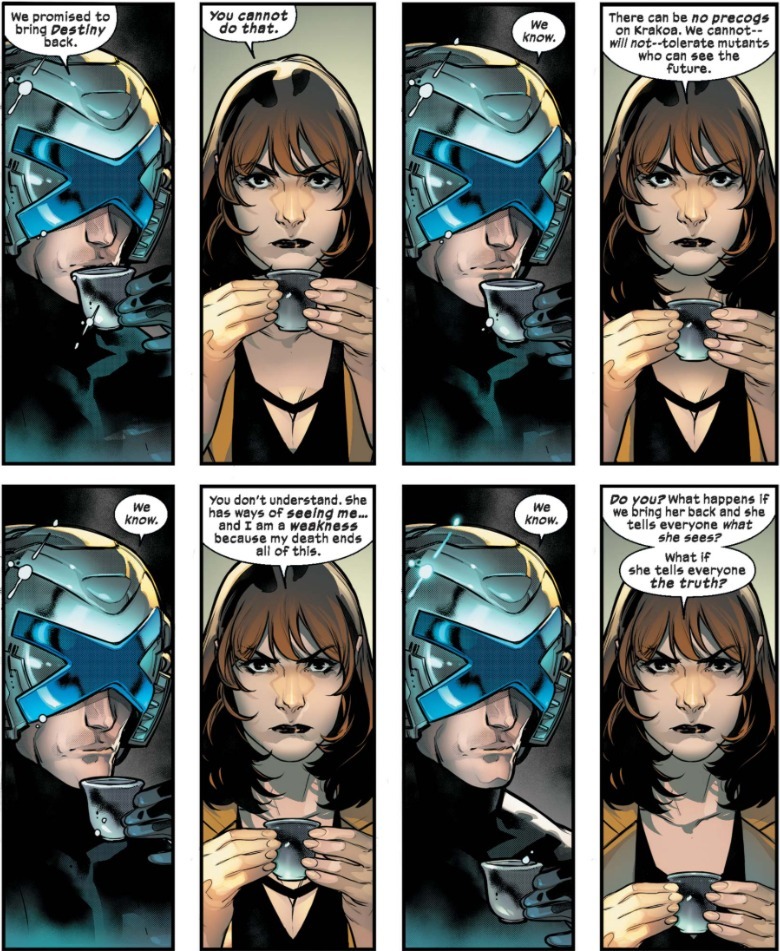Why One Marvel Writer Considers The X-Men His Biggest Disappointment
We may receive a commission on purchases made from links.
Jonathan Hickman has written all of the four major Marvel Comics franchises: the Fantastic Four, the Avengers, the X-Men, and now his ongoing "Ultimate Spider-Man."
Hickman's "Avengers"/"New Avengers"/"Secret Wars" epic is the best long running Marvel story since Chris Claremont's 16-year "X-Men" run. In another world, Hickman's own work with the X-Men could've been as defining as Claremont's... but that's not the world we have. Hickman's "X-Men" earns the comparison to Claremont's in how abruptly it ends; Claremont's titanic run concluded not with a grand finale but when he left due to disputes with his editor, Bob Harras, in 1991.
Hickman put his spin on the mutants in 2019 with the dual miniseries "House of X" (drawn by Pepe Larraz) and "Powers of X" (drawn by R.B. Silva). Marginalized in the comics due to their absence from the Marvel Cinematic Universe, the X-Men needed a revamp to survive at the time. So, under Hickman's pen, the X-Men established a homeland for all mutants on the living island of Krakoa.
This was also another "X-Men" storyline that explored alternate timelines (à la "Age of X"). "House of X"/"Powers of X" revealed Moira MacTaggert, the X-Men's human ally, was a mutant with reincarnation powers. The current timeline is her 10th life, and in all her previous nine, mutants have fallen. Krakoa, and a silent partnership with Professor X and Magneto, is Moira's latest attempt to save her people — and maybe her last, since in a past life the precognitive mutant Destiny told Moira she'd only get 10 lives, maybe 11.
The 2019 "X-Men" relaunch was a huge success, but Hickman left Krakoa behind after the 2021-2022 mini-series "Inferno" (art by Valerio Schiti and Stefano Caselli). The so-called "Krakoa era" continued without Hickman until 2024, followed by the current "From the Ashes" soft reboot that made the mistake, I've maintained, of throwing the X-Men back into the same old, same old.
Hickman pitched his "X-Men" story as unfolding in three acts, but he only got to tell a version of the first one. In Hickman's recent interview on the "Off Panel" podcast, he had the following to say when asked about the hindsight of his experience working on the "X-Men" comics:
"It is the most disappointing creative experience that I've had because I didn't finish the story that I set out to do, which is a cardinal sin and a total bummer. [...] It's really, really difficult for me to talk about it or think about it in any kind of positive aspect because I would've crushed it!"
I believe him! Hickman adds that "a perfect storm," including "business stuff, Covid stuff, [and] publishing schedule stuff," disrupted his plans. He's moved on and been tight-lipped about his plans, but can we decipher what they were and what went wrong?
The X-Men's Krakoa era was an experiment in bringing a writers' room to Marvel Comics
Now, Hickman fans might object to him calling "X-Men" his only unfinished story. "The Black Monday Murders," his creator-owned series with artist Tomm Coker, has been sitting in limbo since 2018. But on "Off-Panel," Hickman maintained the series will get its ending: "It just has to come out when it's done."
"X-Men" is different; Hickman left the story behind and other writers finished it. Hickman was the architect of Krakoa, but others helped build it. After "House"/"Powers" wrapped, Hickman was writing "X-Men" and sharing "New Mutants" with Ed Brisson. There was also "Marauders" (written by Gerry Duggan), "Excalibur" (Tini Howard), "X-Force" (Benjamin Percy), and "Fallen Angels" (Bryan Hill). Many more comics soon followed.
Various folks, myself included, have compared this structure to a TV writers' room with Hickman as the showrunner. While Hickman only has praise for his X-collaborators, I think having many cooks in the kitchen was a double-edged sword that killed Krakoa.
I get why Hickman did it this way. The "X-Men" cast is huge; it's barely an exaggeration to say that every single "X-Men" fan has a different favorite obscure character. Krakoa is such a huge status quo shift that you could barely do all the X-Men justice with a single monthly series of 20+ page comic issues. So, divide the story up and explore different niches in different series. Even Hickman's "X-Men" run was more an anthology of one-shot issues... which is how some would've preferred it.
In 2022, Claremont appeared on "Near Mint Condition" and was asked for his thoughts on the current "X-Men" comics. He found the "lateral" structure, where the different titles overlap and you need to read many books for the whole story, "infuriating." In his own words:
"If Hickman wrote them all [...] that might be an interesting structure, if it was this huge graphic novel that he wrote, but he's passing it off to other people."
Hickman previously wrote two interwoven ongoings ("Avengers" and "New Avengers"), and that worked. But financial realities mean that Marvel was never going to only publish one or two "X-Men" books at a time. The "Dawn of X" trade editions tried to compile all Krakoa issues in order ("Dawn of X" Volume 1 is all the first issue of the first six series, etc.). Except, that's not a satisfying way to read the stories; jumping back and forth between different characters, you lose the thread again and again. It's why I struggle to recommend the whole unwieldy Krakoa era despite its amazing start and later peaks.
There's plenty of strong Krakoa comics that I'd hate to lose, but I feel that a full Hickman-authored story would be more satisfying than the whole of what Krakoa was.
What was the endgame for the X-Men and Krakoa?
"I asked everyone if they were ready [to move to the second act], and to a man, everyone wanted to stay in the first act," Hickman told Entertainment Weekly in 2021. Like the X-Men fans, too many of the other writers embraced Krakoa as being good where Hickman was more ambiguous. Building a nation, even one where oppressed people can live free, is inherently exclusionary and violent.
In Hickman's "X-Men" #4, Professor X, Magneto, and Apocalypse visit the World Economic Forum. Sitting at the table of world leaders, Magneto spells out his plans for mutants to conquer with money and influence. He pointedly eats a steak during this monologue; mutants are no longer lambs to the slaughter, they'll be the butchers. That never happened, and it's possible it was never meant to.
Fans have read between the lines of Hickman's "X-Men" to find what he had in mind. Many believe that Hickman planned for Krakoa to fall to internal fighting but adjusted to create a runway for the other writers. That's speculation, but here's one clue: "Powers of X" #6 established that Moira had banned clairvoyant mutants from Krakoa because she didn't want anyone to know about her. That was a problem for Mystique, who wanted her late wife Destiny resurrected.
In Hickman's "X-Men" #6, it's revealed Destiny had foreseen Krakoa's rise. She warned Mystique to resurrect her and, if she failed, "burn that place to the ground." Hickman paid this off in "Inferno," where Mystique masterminds the resurrection of Destiny. The wives drag Xavier, Magneto, and Moira's plans into the light, upsetting the power balance of Krakoa. The foreshadowing still works (Destiny's order to "burn" Krakoa is why the comic is called "Inferno"), but it feels altered to let Krakoa go on longer.
In 2009, Claremont got to write "X-Men Forever," picking up where he left off on "X-Men." 20 years from now, could we see Hickman realize his plans in a similar way? On "Off Panel," Hickman said "I don't see myself doing anymore X-stuff anytime soon." That's unsurprising given his soreness about how the original project played out. He also seems uninterested in sharing his original pitch; an untold story isn't worth much.
Some of Hickman's comments on "Off Panel" feel like throwing the baby out with the bathwater, but he's aware and proud that "people will still read that ["House of X"/"Powers of X"] trade years from now." The book ends with Professor X and Magneto marveling at what they've accomplished. Hickman should do the same to the "X-Men" comics he did complete.
